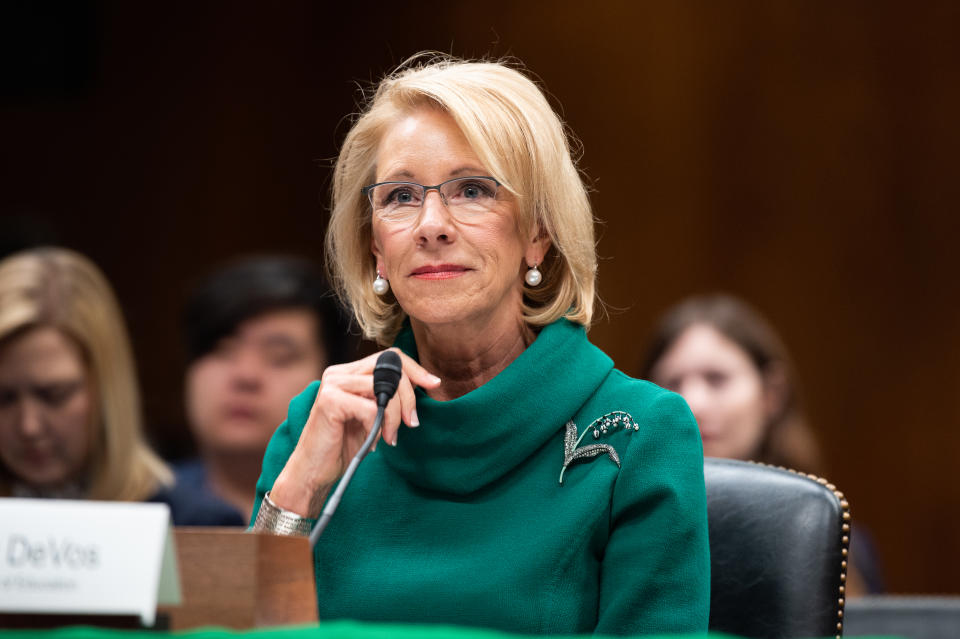New Title IX regulations no longer require coaches to report sexual misconduct

The U.S. Department of Education, led by education secretary Betsy DeVos, announced new Title IX federal regulations that change requirements on who must report sexual assault allegations and how institutions respond to those complaints.
The adjustments, outlined in a 2,033-page document and set to go into effect Aug. 14, no longer require coaches and other employees at colleges and universities to report allegations to the Title IX office. They also give schools a choice in what standard of proof they’d like to follow, bolster protections for the accused and require live hearings and cross examinations.
Title IX no longer requires mandatory reporting in colleges
Under current Title IX guidelines, coaches, athletic directors and other institutional team personnel are mandatory reporters. The same goes for faculty, athletic directors, residential life staff, etc. They are required to report any instance of sexual misconduct or sexual discrimination to the Title IX office or appropriate school officials. There does not need to be a formal complaint to do so.
This stipulation is what has gotten many coaches and institutions into trouble in high-profile cases. Michigan State was fined $4.5 million in September for its mishandling of abuse claims against Larry Nassar.
The new regulations drop the mandatory reporters guidance for coaches and athletic trainers, instead requiring reports to be made to the Title IX coordinator or an official with “authority to institute corrective measures.”
The government changed the rules, it said in the document, to “respect the autonomy of students” to choose whether they want to tell someone with the intent of filing a Title IX report or for another reason. That reason may be "receiving emotional support without desiring to 'officially' report,” per ESPN.
NCAA, SafeSport compliance guidelines differ
These changes won’t necessarily stop coaches and other leaders from reporting the allegations. Coaches might have obligations to report through the NCAA regulations and the U.S. Center for SafeSport, which applies to individuals competing in the Olympic and Paralympic sports.
"The campuses will retain the responsible employee mandatory reporter standard that they have because that's the better practice," said W. Scott Lewis, co-founder of the Association of Title IX Administrators and a partner with TNG, via ESPN.
In 2014, the NCAA determined that “athletics staff, coaches, administrators and student-athletes” must “report immediately any suspected sexual violence to appropriate campus offices for investigation and adjudication.” Last week the NCAA adopted a new policy that requires to annually report acts of violence that resulted in an investigation, discipline or criminal conviction. It’s an effort to address sexual violence and prevent athletes from transferring after a transgression without the school knowing of it.
Colleges and universities may take it upon themselves to require coaches and athletic trainers to continue mandatory reporting under the new Title IX guidelines and they may “institute corrective measures” on behalf of the school.
More changes to investigations, proof required
The changes include a new definition for sexual harassment, adopting the Supreme Court’s definition of “unwelcome conduct that is so severe, pervasive and objectively offensive,” per the New York Times.
Schools are now only responsible for responding to incidents that reportedly happen on campus or in off-campus locations related to school activity, such as at fraternities or school-support events. Students studying abroad are excluded from those rules.
They require live hearings for the allegations in a system that would more mirror legal proceedings in criminal cases and allows for cross-examinations. Students are not allowed to question each other.
The rules give colleges the choice in what standard of proof they follow: “clear and convincing evidence” or “preponderance of evidence.” Preponderance of evidence was required under previous guidelines and is defined as 51 percent of the evidence favors a finding of fault.
More from Yahoo Sports:

 Yahoo Finance
Yahoo Finance 
